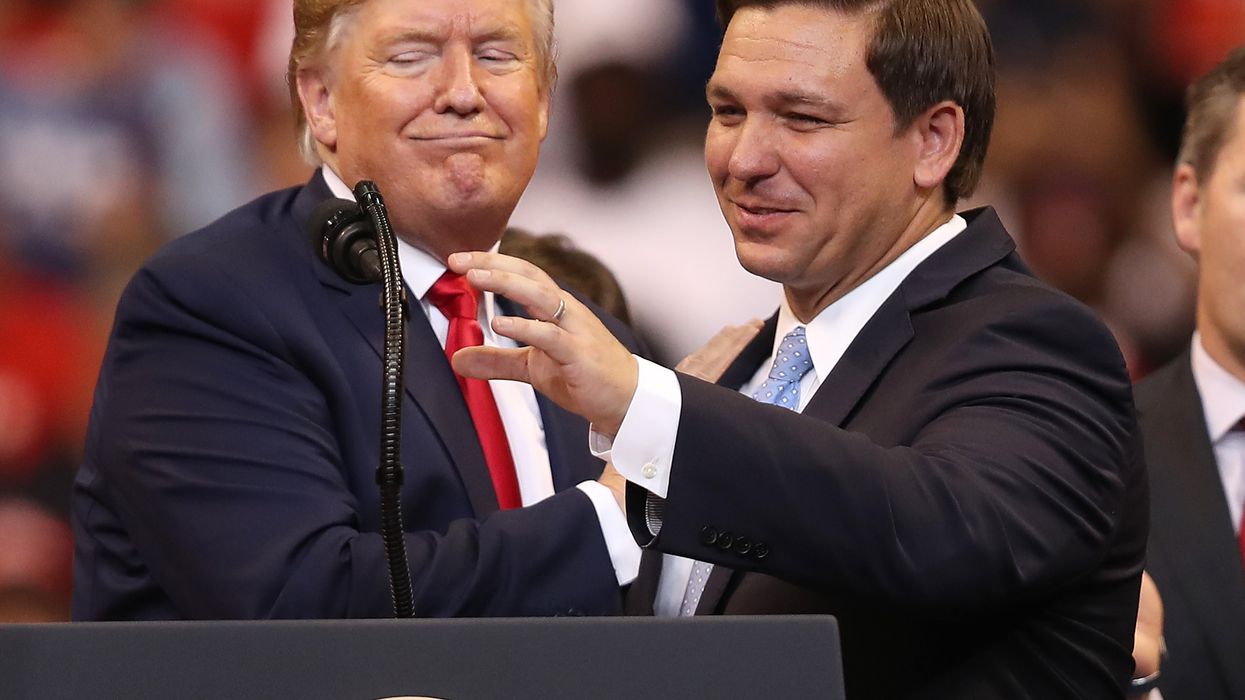While such vivid horrors may be particular to Nero (and his own sense of depravity), Donald Trump’s posture on gender and sexuality does all too grimly echo that of many powerful men throughout history, including those Roman emperors. His sense of comfort in objectifying and demeaning women, whether through his “pussy” dig from the 2016 election or his comments about his friendship with Jeffrey Epstein, who “likes beautiful women as much as I do, and many of them are on the younger side,” is definitely well-documented.
As Soraya Chemaly, feminist writer and author of All We Want Is Everything: How We Dismantle Male Supremacy, pointed out at Salon: “Right after the grab ’em by the pussy tape, we should have [had accountability]… and that’s not what happened. And then after the more than two dozen women came forward with detailed stories that were similar, we should have seen it grind to a halt. But the fact is we don’t care about that kind of predation… we just don’t care. And that’s a function of sexualized violence as a tool of male supremacist oppression in the home, in the street, in politics.”
The behavior of Emperor Nero and President Trump may be reminiscent of each other (and, for that matter, of so many other kings and tyrants throughout history) because using and abusing sex by those in power has been a pillar of past authoritarian systems. Full stop.
Bring up the way sexual predators tend to act with impunity, and you don’t have to go far to find examples. In recent years in the US, there was the genesis of the #MeToo movement—the sexual harassment perpetrated by those in the entertainment industry, higher education, Supreme Court justices, and politicians. And such leaders have learned from the best of them. Scratch under the surface of any authoritarian ruler, in fact, and you’re likely to find cases of harassment and abuse.
Rather than condoning the actions of any tyrants, including the man who today is eager to be one in Washington, DC, the Bible talks about pulling them down from their thrones and lifting up the lowly.
For Rome, those in power dominated the people and nations they subjugated not just economically, militarily, and politically, but sexually, too. Rape and prostitution were central aspects of what it meant to be conquered by Rome. And just as that empire used sexuality (depicting in public art and monuments distinctly gendered conquered nations) to expand its control and territory, the Caesars themselves regulated the sexual behavior of those they had already conquered as a way to further consolidate power. They passed or upheld marriage laws, naming and regulating who could (and could not) marry whom in an effort to promote what they considered proper social order. Although Nero himself broke some of those laws (especially when he castrated someone enslaved to him and proceeded to marry that person, and when he dressed as a woman and married a freedman, violating laws against men marrying men and anyone marrying someone of lower status), it was clear that such laws were easily circumventable by those in power, even while still being fiercely enforced for Roman subjects. (Doesn’t such a double standard still hold true?)
Indeed, in the ways that an emphasis on morality and family values as an ideology helped establish and maintain the social climate and political and economic order of the Roman Empire (while those in power often acted so differently), there are uncanny parallels to the United States today.
Fiddling While America Burns
Sex and sexuality are important ways to understand both Nero’s and Trump’s uses and abuses of power, but the parallels (and the abuses) don’t stop there. Nero is infamous for burning Rome to make way for new building projects and blaming the fires on a marginalized population of his time (Christians) in what may be one of the earliest recorded forms of scapegoating. In Trump’s case, you hardly need look far to find poor and marginalized communities he’s scapegoating: immigrants, trans youth, the unhoused, and the list goes on (and on and on).
Back to Rome, though. Accounts tell us that, while the city burned, Nero sang. (From that, of course, came the phrase that classically describes people in power abdicating all responsibility for helping others in the midst of a crisis: “fiddling while Rome burns.”) While I haven’t heard of Donald Trump singing or playing an instrument recently, certainly destroying the East Wing of the White House to build a “presidential ballroom” while cutting tens of millions of people from food assistance could be considered a modern equivalent.
And a charge against that particularly corrupt emperor that has stood the test of time is that the reference to 666 (sometimes known as the devil or the anti-Christ) from the Book of Revelation is actually a code for Nero, indicating that in biblical lore he was a central adversary of the Jesus movement. Therefore, when President Trump or any of the Christian nationalists in power today try to liken themselves to the protagonists in biblical stories, we should stop in our tracks and remember that, if there are such parallels, it’s certainly between the Caesars and Trump, the emperors and tyrants of thousands of years ago and today’s all too rich and ever more authoritarian ruler.
After all, rather than condoning the actions of any tyrants, including the man who today is eager to be one in Washington, DC, the Bible talks about pulling them down from their thrones and lifting up the lowly. Have you seen the T-shirts at some of the Chicago immigrant-justice protests in recent weeks with quotes from Mary’s Magnificat, that hymn of praise from the gospel of Luke? They’re amazing! (And their quotes from sacred texts and traditions to call out the powerful and defend the immigrant, heal the sick, and feed the hungry are historically and contextually aligned with the arc of the Bible.)
What the Bible Says About Sexuality
Bishop William J. Barber II poses this powerful question about the use and abuse of religion in our day: “Why is it that some who call themselves Christians are so loud about things that the Bible says so little about and so quiet about the things the Bible says so much about like justice and kindness?” Indeed, Jesus and the Bible really had very little (in some cases nothing) to say about issues like same-sex marriage and abortion. It is a fact, however, that when there is a message in the Bible’s text about sex and sexuality or gender expression and moral values, that message is always about justice, inclusion, and love.
For instance, the Apostle Paul’s letters are often used these days to prop up homophobia and misogyny—messages like good Christians aren’t LGBTQIA or don’t enjoy sex or that people are all too often poor because they’ve had too many babies, or that they’re lazy or drug-addicted, and so are sinners. As it happens, though, what’s truly sinful, according to such Biblical passages, is not homosexuality, or being transgender, or having consensual sex, but greed and exploitation, the unholy alliance between the wealthy and those who make laws to deny people their rights. Yes, Paul’s letters are indeed among a few biblical texts often quoted to condemn abortion or deny the rights and bodily autonomy of people. So, consider it a distinct irony that, at the core of Paul’s writings aren’t the behaviors of the poor or women or LGBTQ people, but the vices of empire.
Indeed, if there is a biblical critique of sex and sexuality, it’s one to be levied against the wealthy and powerful, the Trumps and Epsteins of this world.
One Greek word the Apostle Paul is concerned with is sarkas, usually translated as “works of flesh.” Paul defines such fleshy “works,” however, as: sexual immorality, lewdness, idolatry, hatred, discord, jealousy, fits of rage, selfish ambition, envy, gluttony, and the like. At first, it may indeed sound like a list of personal behaviors and characteristics. But notice that idolatry, hatred, discord, and gluttony are not just individual behaviors, especially not those of the poor and powerless. Instead, they are acts of an unequal and exploitative world that actually uses and abuses the poor and marginalized.
Indeed, if there is a biblical critique of sex and sexuality, it’s one to be levied against the wealthy and powerful, the Trumps and Epsteins of this world, not teenagers and their families seeking gender-affirming care, women seeking abortions, or transgender people seeking a place in sports or the military. And it’s surely not a polemic with same-gender loving couples or poor trans love.
Trump’s Distorted Morality
Since taking office (and as part of what catapulted him into the White House in the first place), President Trump has been continually raising alarms about the supposed moral crises besetting this country and the need for a strong man to resolve them. In this, he’s been following in the path laid out by the Nero-like authoritarians and tyrants of history. He’s been issuing regular executive orders aimed at doing everything from banning transgender women in sports and transgender troops in the military to punishing the unhoused and immigrants, while cutting families in need off from lifesaving food.
And his executive actions are only the tip of the spear of a significantly larger legislative attempt to target and scapegoat others (while distracting attention from the Epstein files and other controversies surrounding him). This year, 1,012 anti-trans bills have been introduced in American legislative bodies at both the state and federal levels. Trump’s “Big Beautiful Bill” cut millions of dollars in food and healthcare, but included $45 billion to detain adult immigrants and their families, as well as an additional $32 billion for immigration agents to pursue enforcement and deportation policies.
Trump’s attacks on abortion, same-sex marriage, and trans youth in the name of family values and “morality,” his efforts to cut welfare, healthcare, wages, and other life-sustaining programs, and his emphasis on policing and militarizing communities (allowing guns to proliferate) while talking about peace and security, may be covered by Christian nationalism but they are not in any sense biblical.
After all, the Bible’s authors, living through the world of imperial Rome, agreed that there was a moral crisis occurring. People were losing their land, had turned away from the God of liberation and justice, and were generally complying with a system of subjugation and oppression. Meanwhile, the emperors were trampling on all too many of their hopes and values, including by sexually exploiting them. And none of that was to be tolerated.
There is a similar moral crisis occurring today, and Donald Trump is at its very heart. Jackson Katz, creator of the 2024 film The Man Card: 50 Years of Gender, Power, and the American Presidency, raises the ultimate “moral” question about Trump’s complicity in sexual predator Jeffrey Epstein’s abuses and what will come of his own sexual predations, then and now. He writes, “It’s still far from clear whether Trump ultimately will be held accountable for his actions—or inactions—over the course of his long friendship with the convicted sex trafficker Jeffrey Epstein, our era’s most notorious and prolific sexual abuser of girls. Will this finally be the moment when Trump pays a real price for his misogyny?”
If we are to channel the Apostle Paul and the message of Jesus, time’s up. As the gospel tradition makes all too clear for Emperor Nero (aka the anti-Christ or Satan), President Trump, “Your kingdom must come down!”




